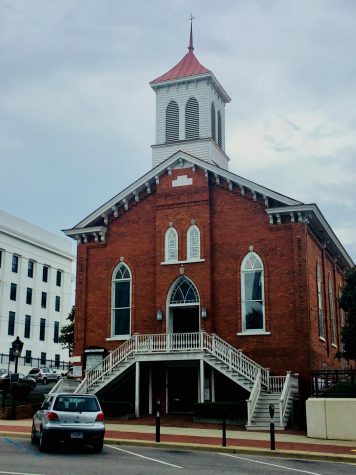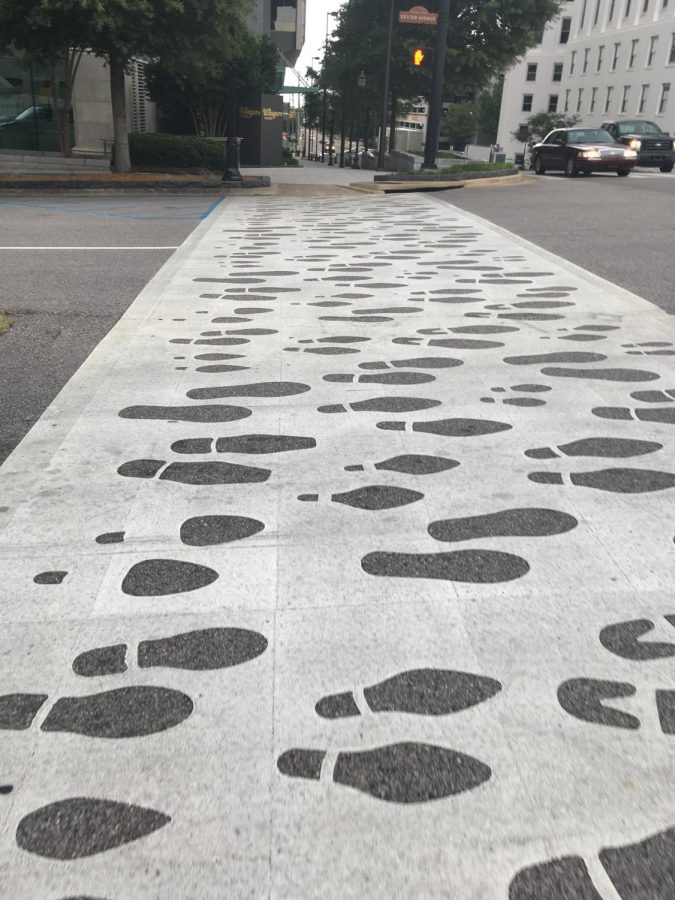Cydney’s Summer Trip
Artwork on a sidewalk in Birmingham, Alabama shows the path traveled by protesters and the journey they’ve endured
October 11, 2018
Can you think back to one of your favorite summer vacations or trips? Was it a visit to the glorious beaches of Hawaii, a trip down to the magical world of Disneyland or maybe simply visiting family you haven’t seen in a while? Just reminiscing probably has you feeling like you aren’t stuck at school for eight hours. Don’t worry, I hear you loud and clear. My summer this year was one I’ll never forget. My family had been planning for this trip for about a year. It was predominately about my roots, or where I came from. The places we visited were Memphis, Mississippi, Alabama and Atlanta.
The day we flew out to Memphis, Tennessee, I could barely sit still in my seat. I was eager to explore an entirely new state and see what it had to offer. The day after we landed, my family and I went to the Civil Rights Museum. I know what you’re thinking. Why in the world would I go all the way out to a new state just to see a museum? Well, this wasn’t just any museum. The museum was built inside the motel where Martin Luther King Jr. was shot and killed. Stepping out of the car and just staring at the outside of the Lorraine Motel gave an eerie feeling at first, but it was quickly replaced with awe. I had heard of the death of Martin Luther King before, but to see where it took place… it was extraordinary. The inside of the museum displayed the journey and hardships we African Americans have been through and to this day still face. The museum featured a replica of the bus that Rosa Parks was arrested on, experiences of people protesting prejudice acts and artifacts from the Black Panther party, an organization that created the free breakfast programs of today and wanted to end police brutality in black neighborhoods.
A quote that stood out to me the most from Martin Luther King Jr. was, “Darkness cannot drive out darkness; only light can do that. Hate cannot drive out hate; only love can do that.” The display that stood out the most was the motel room Martin Luther King stayed in before he died. It was a huge “wow” moment for me that I remember the room growing silent. I remember sitting there imagining what it must have been like inside that room moments before his death. He was a leader who made things possible for me to even have a trip like this. Right across from the motel was the actual building of where James Earl Ray assassinated Martin Luther King. Inside the building which was also a part of the Civil Rights Museum showed displays of what led to the assassination. Towards the end of my visit to the museum, I started to have a deeper understanding of my culture and what it means to me to be an African American.
Two days after exploring a little more of Memphis, we went to Mississippi, the “deep south.” As soon as we stepped out of the car, we were met with the sight of guineas scurrying across the farmland, the sound of bugs buzzing to and fro, the refreshing smell of the forests surrounding us and the distant crowing of roosters in the background. We drove to Salis, Mississippi where my grandpa was born. There, for the first time, I met my Aunt Sue and Uncle Joe. Both are two loving people with their arms wide open to us and everyone. We stayed in their trailer house that was surrounded by a farm and acres of trees. My Aunt Sue and Uncle Joe live in the same land that my grandpa was born and raised. To know that made me feel so lucky and privileged to able to stomp the same grounds my own grandpa did. I also met my Uncle Sam, Aunt Dorthy, Uncle Lonzo and Aunt Mattie who both live less than a mile from where my Aunt Sue and Uncle Joe live.
The next day, my parents and I woke up early to go to Vaiden. Vaiden is a small town in Mississippi that my Grandma Helen grew up along with her three sisters and two brothers. While we were there, we saw the very church my grandma went to when she was younger, Midway United Methodist Church. I could already imagine my grandma as a little girl playing with her sisters, brothers and friends around the grassy church grounds. My parents and I went over to the graveyard right next to the church where I saw a sea of familiar names. The Pickens’ and Flukers’ which are a part of my maternal grandma’s side of the family and the Blackmon’s who were cousins to my grandma as well. Being there at the graveyard gave me a sense of belonging. These were members I’d heard countless stories about that made me wish I could have spent time with them to see all their different personalities. We headed back to Salis where we visited to my Grandpa Curtis’s church, Macedonia Church. There I saw the ancestors on his side of the family. It was such a great experience to see both churches and to see where I came from.
After a few days in Salis, Mississippi, we headed out to sweet home Alabama. I loved Alabama. It had so many historical sites (being the history buff I am). There we went to the Edmund Pettis bridge. The Edmund Pettis bridge isn’t just any bridge. It is the bridge that Martin Luther King Jr., John Lewis and Reverend Ralph Abernathy led the march from Selma to Montgomery to establish voting rights for African Americans. I was able to walk across that bridge, and I could already imagine the actual march. All the people of color like me linking arms together in unity singing hymns as they walked across peacefully protesting for their rights. It felt so empowering to walk where they did. After crossing the bridge, we drove to drive the rest of the way to Montgomery to follow the path of the march which was on Highway 85. Along the way we saw the four campsites the marchers stayed in on their way to Montgomery. Once we made it to Montgomery, we saw the Capitol, where the march ended. About a couple hundred of feet in front of the Capitol, were displayed sets of footprints that represented the people who were a part of the march. On the right was the Dexter Avenue King Memorial Baptist Church. This church was where Martin Luther King Jr. was a pastor from 1954-1960 and where the Montgomery bus boycott was organized. A few blocks away from the church, was the Alabama house where MLK lived. My dad lived in Alabama until he was five years old before he and his family moved to California.
The next day, we drove by some houses that the relatives on his side of the family lived in. We then later stopped by Greater Pleasant Grove Missionary Baptist Church. The still up and running church is where my dad and his family attended. We saw the gravesites of my dad’s side of the family including the gravesite of my great-grandfather, Arthur Macon. Afterwards, as we were driving my dad stopped the car in front of an old outside barbershop labeled Witts. He told me “Witts” was the name of the barber that used to cut his and his brother’s hair when he was younger. Behind the barbershop was the house of Mr. Witts.
Next we went to Atlanta, Georgia where we have our family reunion every two years. I used to think that my dad had the bigger family, but it turns out both my mom and my dad each have a big family. I have a bigger family than I thought. This trip truly made me realize who I am and where I came from. From learning about the challenges that my race has faced and the civil activists such as Martin Luther King, Angela Davis, Rosa Parks, Corretta Scott King and so many others that made it possible for me to be who I am now. Especially the people in my family who went through some similar challenges who made it possible for me to be where I am. I suggest a trip like this for everyone to know their backgrounds and to learn about their roots. Learning these things gives you a deep understanding of who you are and even a little confidence. Since the trip, I’ve realized that each step I take, every school day and every accomplishment I make, is possible because of the people who sacrificed everything to make sure the future generations can walk freely in peace, and to continue the march they began.



Albert Macon (Proud Poppa) • Oct 11, 2018 at 3:25 pm
Proud of you Cydney! Great re-cap of our trip. Your story helped me to realize how special this trip was for the entire family.